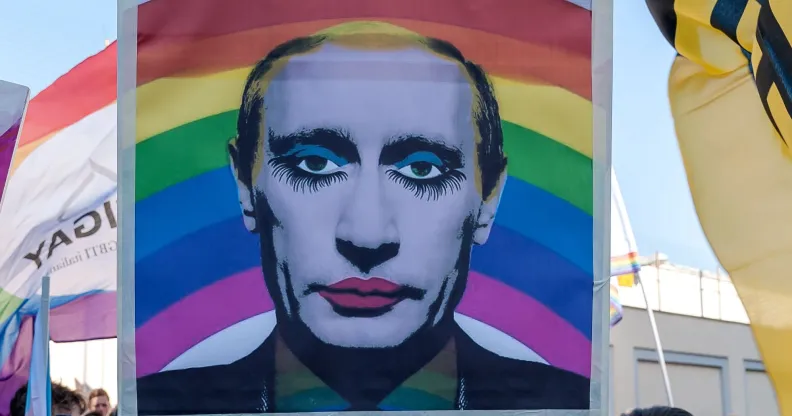Russia declares ‘international public LGBT movement’, which does not exist, an extremist group

The ruling will effectively outlaw LGBTQ+ activism in Russia. (Getty)
Russia’s supreme court has declared LGBTQ+ activism illegal, in a culmination of a continued crackdown on the community.
The declaration by the nation’s top court effectively outlaws LGBTQ+ activism by branding as “extremists” what it calls the “international public LGBT movement” – which does not actually exist.
A request into the non-existent entity was filed by Russia’s justice ministry in November without defining what the term actually meant.
It argued that authorities had identified “signs and manifestations” by LGBTQ+ people, which it claimed to be part of the movement, that were of an “extremist nature” which included what it describes as an “incitement of social and religious discord”.
There is no evidence for these claims.
The ruling was handed down less than a month later following a closed-door hearing with no defendant for the vaguely defined entity present.
It could leave all Russian citizens who identify as LGBTQ+ in danger of lengthy prison sentences, if they are deemed to be part of the so-called movement.
‘Gay propaganda’ laws silencing LGBTQ+ people in Russia
Human rights groups in Russia and beyond have widely condemned the declaration as another example of blanket prejudice in the widely homophobic country.
Igor Kochetkov, the head of the Russian LGBT Network, said the ruling means that queer activism will effectively be impossible in the future.
Additionally, human rights lawyer and LGBTQ+ activist, Max Olenichev, told the Associated Press: “In practice, it could happen that the Russian authorities, with this court ruling at hand, will enforce it against LGBT+ initiatives that work in Russia.”
The ruling follows years of attacks on LGBTQ+ rights in Russia, including a range of homophobic laws. In 2013, the country adopted legislation censoring what it described as “gay propaganda,” which it vaguely defined as content endorsing “non-traditional sexual relations” to children.
The law has since been extended with amendments that outlaw same-sex marriage, as well as extending the censorship rules to content for adults.
Russia has also implemented laws banning gender-affirming procedures for trans people and prohibits what it described as “medical interventions aimed at changing the sex of a person.”
Speaking to Reuters, LGBTQ+ activist Alexei Sergeyev described the latest development as very alarming, adding that he does not “remember the threat ever being so serious and real”.

